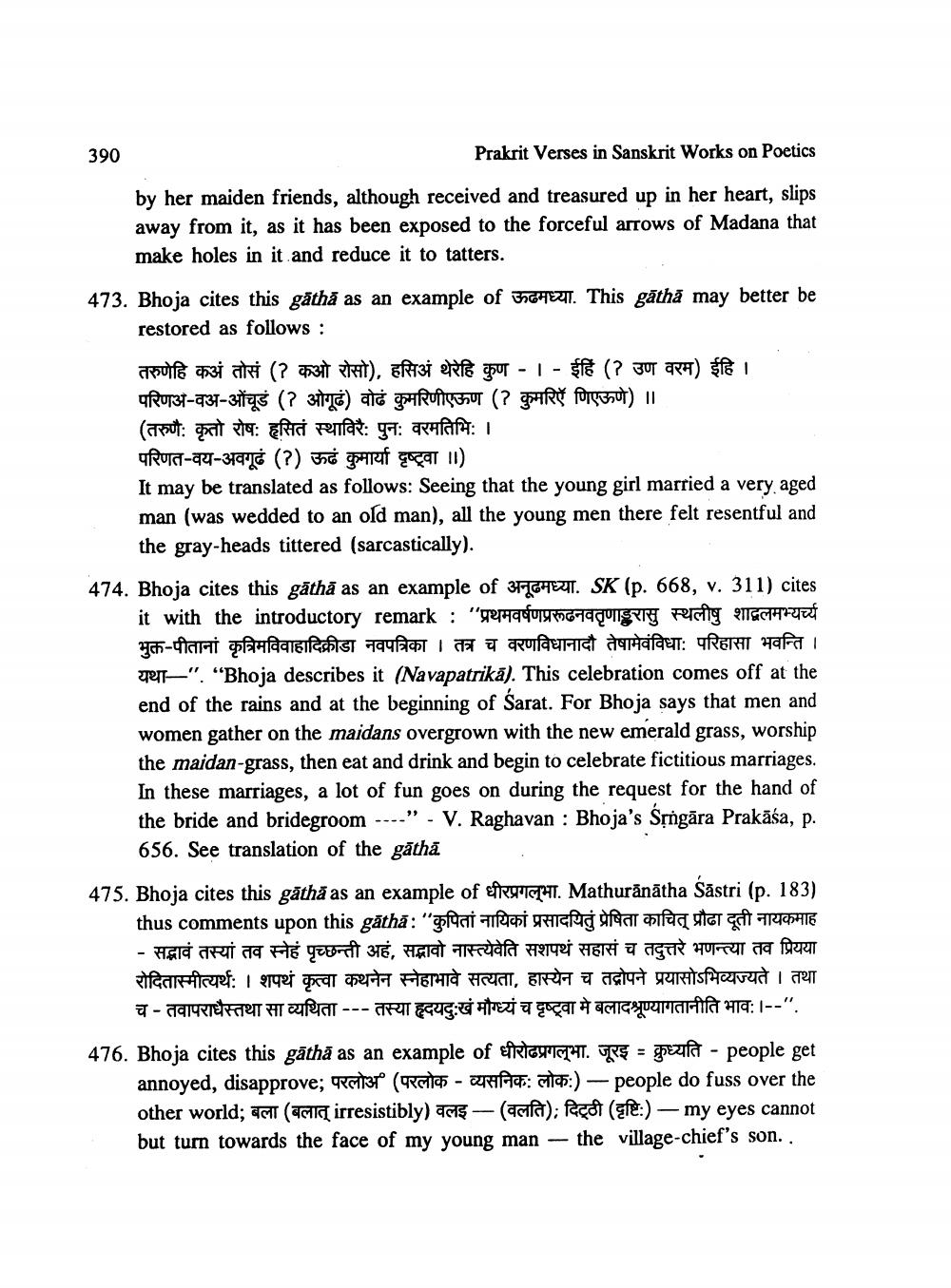________________
390
Prakrit Verses in Sanskrit Works on Poetics
by her maiden friends, although received and treasured up in her heart, slips away from it, as it has been exposed to the forceful arrows of Madana that make holes in it and reduce it to tatters.
473. Bhoja cites this gåtha as an example of 356 EZT. This gāthà may better be
restored as follows :
तरुणेहि कअं तोसं (? कओ रोसो), हसि थेरेहि कुण - | - ईहिं (? उण वरम) ईहि । परिणअ-वअ-ओचूडं (? ओगूढं) वोढं कुमरिणीएऊण (? कुमरिऍ णिएऊणे) । (तरुणैः कृतो रोष: हसितं स्थाविरैः पुन: वरमतिभिः । परिणत-वय-अवगूढं (?) ऊढं कुमार्या दृष्ट्वा ।) It may be translated as follows: Seeing that the young girl married a very aged man (was wedded to an old man), all the young men there felt resentful and the gray-heads tittered (sarcastically).
474. Bhoja cites this gatha as an example of अनूढमध्या. SK (p. 668, v. 311) cites
it with the introductory remark : "प्रथमवर्षणप्ररूढनवतृणाडुरासु स्थलीषु शादलमभ्यर्च्य भुक्त-पीतानां कृत्रिमविवाहादिक्रीडा नवपत्रिका । तत्र च वरणविधानादौ तेषामेवंविधा: परिहासा भवन्ति । यथा-". "Bhoja describes it (Navapatrika). This celebration comes off at the end of the rains and at the beginning of Sarat. For Bhoja says that men and women gather on the maidans overgrown with the new emerald grass, worship the maidan-grass, then eat and drink and begin to celebrate fictitious marriages. In these marriages, a lot of fun goes on during the request for the hand of the bride and bridegroom -..." - V. Raghavan : Bhoja's Srigara Prakasa, p. 656. See translation of the gatha
475. Bhoja cites this gatha as an example of धीरप्रगल्भा. Mathuranatha Sastri (p. 183)
thus comments upon this gatha: "कुपितां नायिकां प्रसादयितुं प्रेषिता काचित् प्रौढा दूती नायकमाह - सद्भावं तस्यां तव स्नेहं प्रच्छन्ती अहं, सद्भावो नास्त्येवेति सशपथं सहासं च तदत्तरे भणन्त्या तव प्रियया रोदितास्मीत्यर्थ: । शपथं कृत्वा कथनेन स्नेहाभावे सत्यता, हास्येन च तद्गोपने प्रयासोऽभिव्यज्यते । तथा च- तवापराधस्तथा सा व्यथिता --- तस्या हृदयदु:खं मौग्ध्यं च दृष्ट्वा मे बलादश्रूण्यागतानीति भावः।--".
476. Bhoja cites this gatha as an example of धीरोढप्रगल्भा . जूरइ = क्रुध्यति - people get
annoyed, disapprove; परलोअ (परलोक - व्यसनिक: लोक:)-people do fuss over the other world; बला (बलात् irresistibly) वलइ-(वलति); दिट्ठी (दृष्टि:)-my eyes cannot but turn towards the face of my young man - the village-chief's son..




